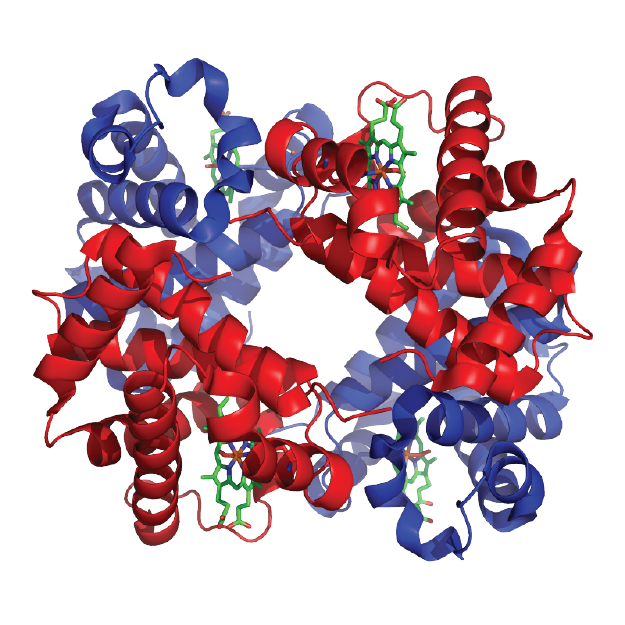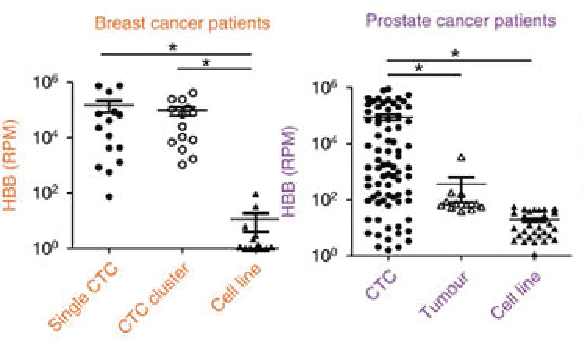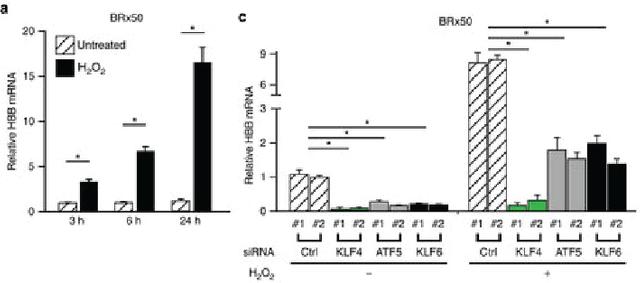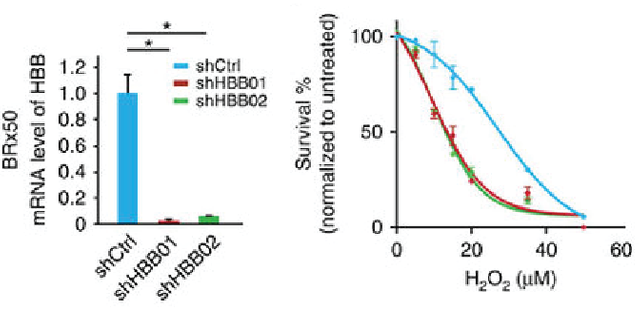Better Understanding The Spread of Cancer: β-globin Protects Cancer Cells During Metastasis
Two weeks ago I wrote a post sharing some new work looking into why cancer cells metastasize (why they spread from one localized tumor, to multiple tumors in different organs).
Many questions about this process remain, for example: How do the cancer cells traveling through the circulatory system survive the high oxadative stress environment of our blood stream?
New research published today February 9, 2017 in the journal Nature Communications titled "Expression of β-globin by cancer cells promotes cell survival during blood-borne dissemination". Sheds some light on this question and today I would like to briefly share that with you.
Lets Begin With The Articles Conclusions
- Through use of a technique called RNA-Seq, researchers observed high expression levels of the protein β-globin in tumor cells circulating in the blood stream, this result was unexpected.
- β-globin is expressed in these cells in response to the presence of reactive oxygen species.
- An additional protein called KLF4 was identified as a controlling factor in the generation of β-globin in response to these reactive oxygen species, so there are regulatory mechanisms.
- β-globin increases cancer cell survival in the blood stream and metastasis rate (based on new tumor formation)
- In cancer cells where β-globin expression was knocked down (reduced in its expression level), the addition of an antioxidant "N-acetyl cysteine" restores metastasis rates. AKA if there is less β-globin the oxidative stress kills the cells, but reducing that stress allows the cancer cells to flourish again.
What Is β-globin?
You are all familiar with hemoglobin right? It's the protein in our blood that is responsible for carrying oxygen and delivering it to all of our cells. Hemoglobin is actually a protein complex, composed of two copies of two different protein chains (aka their are 4 pieces in total).

The image above is that of hemoglobin, you can see that there are two different colors red and blue. The red colored portions are the protein α-globin while the blue is the protein β-globin.
So for the sake of this post, think of β-globin as a piece of hemoglobin, that is able to exist on its own, in addition to being a part of the oxygen shuttling complex.
Note both α-globin and β-globin can form complexes with themselves as well and form structures that are similar to the mixed mature hemoglobin.
The Results Of The Research
Expression of β-globin Is Elevated in Cancer Cells Circulating In The Blood
The first thing the researchers noticed was that the amount of β-globin (it's called HBB in the figures) being produced by cancer cells was elevated, and the amount being produced by cancer cells that were circulating in the blood, was elevated even further.

Above are plots of the expression levels observed for two different cancer cell lines, with cells that were either circulating in the blood (CTC), in a solid tumor and not circulating (Tumor), or non cancer cells from the same tissue type (Cell Line). You can see that the CTC cells always show the highest amounts of β-globin.
The Increased Expression Of β-globin Is Controlled By The Protein KLF4 In Response to Reactive Oxygen Species
Researchers found that when treated with a reactive oxygen species (in the case of the figure below hydrogen peroxide (H2O2) that expression of β-globin increased.

The researchers also found that through gene knock-down techniques (using small interfering RNA's or siRNA) that if they knocked down a gene responsible for creating a response to reactive oxygen species called KLF4 that the expression of β-globin in response to those reactive oxygen species was eliminated. Compare "ctrl" (control, nothing knocked down) to "KLF4" (KLF4 knocked down) for the two plots, one has H2O2 added and the other does not. You can see that when KLF4 is knocked down there is no response to the H2O2 addition.
β-globin Protects Cells From Dying Due To Reactive Oxygen Species
Here the researchers created cell lines where the β-globin protein was knocked down, the first figure below shows the amount of β-globin present in the cancer cell lines. shCtrl is the control cell line where β-globin was not knocked down, the other two shHBB01 and shHBB02 are the cell lines where β-globin is knocked down and as you can see the experiment results in low expression levels in those cells.

Now, the researchers exposed the cells to increasing amounts of H2O2 and as you can see in the plot to the right, the cells that had the β-globin knocked down (the red and green traces) were not able to live in concentrations of H2O2 as high as the control cells (blue trace). This indicates that β-globin is protecting the cancer cells from death by reactive oxygen species when those cells are traveling in the blood.
β-globin Also Assists Tumors In Growing
Researchers also wanted to monitor the effect of β-globin on tumor growth and metastasis. To do this they engineered the tumor cells to express a protein called luciferase. This protein doesn't have anything to do with the devil, rather it produces light. With this, the researchers could monitor the tumors based on detecting the light emitted.

Here we see in the pannel to the left, that a mouse had four different cell lines implanted, the control still expressing β-globin and three β-globin knock down cell lines. You can see that after 27 days of allowing the tumors to grow and spread, that the growth was significantly greater for the control cells still expressing the β-globin, then it was for any of the other three where β-globin was knocked down.
In the figure to the right cells were directly injected into the mouses tail vein. You can see that the cell lines where β-globin was knocked down showed drastically less growth.
TL;DR
Researchers were studying the expression levels of proteins in cancer cell lines that are found traveling in blood. They surprisingly identified that a protein component of hemoglobin (β-globin) is highly expressed in these cells. As it turns out, their research indicates that β-globin is involved in protecting the cancer cells from reactive oxygen species in the blood, and allows for the cells to metastasize and grow more quickly.
Sources
- http://www.nature.com/articles/ncomms14344
- https://en.wikipedia.org/wiki/HBB
- https://ghr.nlm.nih.gov/gene/HBB
- https://en.wikipedia.org/wiki/Reactive_oxygen_species
- https://en.wikipedia.org/wiki/KLF4
- https://ghr.nlm.nih.gov/gene/HBA1
- https://ghr.nlm.nih.gov/gene/HBA2
All non Cited Images Are Available Under Creative Commons Licenses
Any Gifs Are From Giphy.com and Are Also Available for Use Under Creative Commons Licences
Articles Published in Nature Communications and Images Contained Therein Are Also Available for Use Under Creative Commons Licences
If you like my work, please consider giving me a follow: @justtryme90. I am a PhD holding biochemist with a love for science. My future science blog posts will cover a range of topics in the biology/chemistry fields.
Thank you for your continued support of my work! I appreciate all those who follow me (and those who don't too).
Thank you to @jaki01 for editing suggestions/corrections
I like this interesting article. Things are explained in a very clear way.
I think in one sentence there is missing a word (sorry to be so pedantic, but at least it proves someone is really reading your texts haha):
"In cancer cells where β-globin expression was knocked down (reduced in its expression level), the ....?.... of an antioxidant "N-acetyl cysteine" restores metastasis rates." (impact? / production? / presence?)
the missing word is addition. Will correct. Thank you for pointing this out, for reading and commenting. :D
it should read "In cancer cells where β-globin expression was knocked down (reduced in its expression level), the addition of an antioxidant "N-acetyl cysteine" restores metastasis rates."
Haha, I at your place had answered it was just a quiz who would find the suitable word. ;-)
But I should better write something to your article itself: Are there any ideas how to exploit this new knowledge - for example to suppress the responsible genes in the tumor cells or to combat the ß-globin of the metastasizing tumors in the blood (without to harm the hemoglobin within the erythrocytes)? But ok, maybe all this wouldn't be more effective than conventional methods to combat tumor cells and could be also rather complicated in practice ...
Well the identification of KLF4 as a regulator of β-globin expression is interesting. It's thought to be a cell cycle regulator, but this indicates its involved in other pathways as well. Perhaps targeting it might be an interesting avenue for further research to help limit metastasis in especially aggressive cancers.
so many people have worked on cancer treatment and prevention for their whole lives......
What will they do with their lives when its cured
Work on something else and be elated that their lifes work was fruitful. There are so many problems that we can't even begin to tackle as we are still trying to understand those that kill so very many lives like cancer. Plenty of work still to be done.
They're skilled enough to find a new job, don't worry.
not talking about the job itself..........
So what you were talking about?
i've heard Anti oxidants are good to prevent cancer. Once you have caner they are the last thing you want.
Cancer is so complicated. Everything I know changes as soon as I know it.
Biology is complicated, the regulation of cellular function is an extremely large network of very tightly controlled concentration and cell cycle dependent interactions. When everything is as it should be, it works great, but once something goes awry... its tough to correct.
Anti oxidants are good to prevent cancer, as oxidative stress can cause an uptick in other regulatory pathways that lead to mutation.
However once you have a tumor cell... your perspective changes, then you are okay with oxidative stress because it damages the cell you don't want.
ah so. interesting.
Cancer will not kill me though.. I expect an accident will get me.
Said many people who then died from cancer.
that is very true. But i know the secret to curing cancer.
Right.
Very good article. Thank you!
Thank you for reading and commenting! I am glad you liked it. Dive into the primary article for more, it's quite a fascinating paper.
Edits Round 1: Corrected a sentence to include the word addition, corrected misspellings.
Edits Round 2: Corrected some its/it's mistakes. Added the acronym for β-globin "HBB" earlier in the text for clarity when looking at the figures.
jag gillar den tack
?